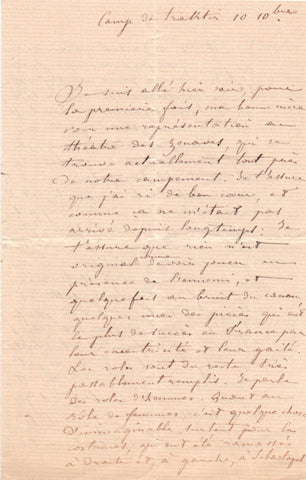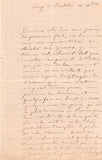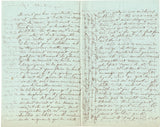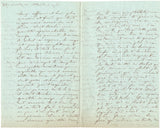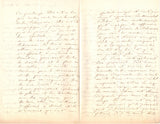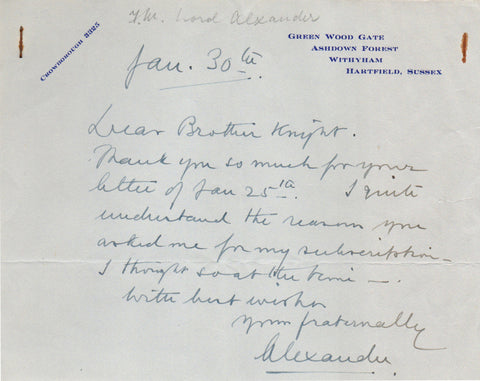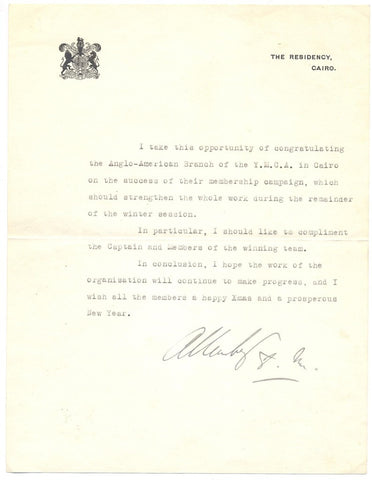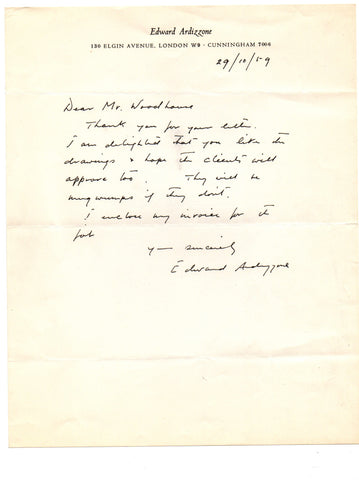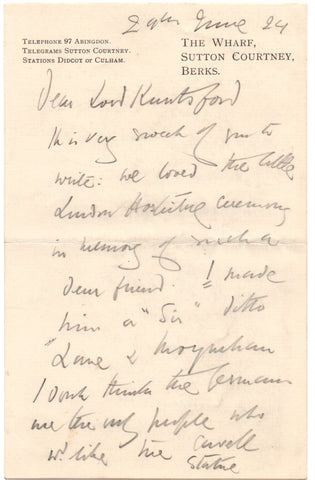CRIMEAN WAR - Letters home from a French officer at the front 1855-56
[CRIMEAN WAR]
Group of 13 letters from Hippolyte Delphin, second lieutenant on the French General Staff, to his mother, starting two months after the fall of Sebastopol to the end of the war, giving news of conditions at the front, ineffectual bombardment by the Russian forces and news of the peace treaty.
In all, 54 pages 8vo in French, Traktir, 26 November 1855-14 April 1856.
A very interesting group of letters, filled with details about the daily life of the French troops and comments on their Russian counterparts, interspersed with messages to his family.
The letters are dated from “Traktir”, which strongly suggest that Delphin was present at the battle of Chernaya on 16 August at which the Russian forces were successfully repulsed at the Traktir Bridge by the French and their Sardinian allies. By the time he wrote these letters, things were considerably quieter, and Delphin reveals a certain talent for making himself comfortable even in difficult conditions.
Translations of excerpts of the letters will give a taste of the contents; Delphin’s French spellings of names and places have been kept:-
26 November 1855: “. . . I have had the interior of my tent dug out, and a small wall will be built around it so that I will be well protected from the cold. I will also have a small chimney – many tents are set up in this fashion . . . In any case, regardless of what one says, the climate in the Crimea is excellent. . . .
Something untoward for the Division occurred the other day. The Lt. Colonel and a captain wandered too close to the Russians and were taken prisoner. They have written several times and they are admirably well treated by the Russians. They were taken to Prince Gorschakoff’s HQ in the general’s own carriage . . . and the general in chief invited them to dinner and told them that until they leave, they will eat at no other table but his. You see that we are dealing with people who are more civilized than we think. It is true that they only behave this way towards the French, for they have an aversion to the English.”
10 December [1855]: “Last night I went . . . to see a show at the zouave theatre . . . I roared with laughter . . . There is nothing so unusual as to see a show in the presence of the enemy, and occasionally to the sound of cannons, some of the numbers are very successful in France in their exentricity and their gaiety. . . . As for the parts for women, you cannot imagine it, especially the costumes . . .
There was talk this morning of a small affair . . . The Russians, probably misled by false reports tried to take the 7th Chasseurs who they thought cut off. They attacked this battalion with 4000 men. But, as always, they were defeated. They had 150 killed or wounded and about 30 prisoners, of whom two officers. We had two killed and five wounded. . . .
We are awaiting orders from Paris to know what we are to do, for it is impossible to remain in this position . . . All competent men say that it is impossible to advance, and the only option is to move elsewhere. But where is elsewhere? . . .”
31 December 1855: “. . . I have as much wood as I need for heating. . . . We get it . . . in a forest which we were clever enough to occupy. This forest belongs to Prince Woronzoff. He does not imagine that at this moment his wood is heating and providing cooking fuel for the whole of the French army. . . .
Nothing new militarily. At the centre, where we are, it is entirely quiet. To our left, there is Sebastopol . . . it won’t be long before we blow up the docks and the barracks, and then there will be nothing left of that unhappy city. To our right, at Baidar, volunteers have been organized to go harass the Russias every night and take prisoners. But it does not come to anything major. . . .”
20 January 1856: “. . . On the 16th I went again to Sebastopol with the general . . . We visited the Mamelon, Malakoff . . . Little Redan and Great Redan. . . One wonders how we managed to take some of these places. . . It is prodigious and enormous. . . . As we were mounted and there were many of us including the escort, the Russians, as usual, fired their cannons at us, but from afar, so that they injured no one. They are mad about this sort of noise. They never stop firing, even though they know it will do no, or at least little, damage. But there are times when . . . whether at Sebastopol or at Traktir, night and day they fire and light up the entire valley. Why? . . . They waste their ammunition, powder and money for nothing. . . . It seems to amuse them. . .”
27 January [1856]: “We heard a few days ago . . . that the Russians had accepted the peace proposals made by the Western Powers. . . . I must admit that the more definite hope of having peace soon has been welcomed by the army . . . All those who have been here for a year or more say that they have had enough . . .
In the Crimea, nothing new. The position of the two armies remains the same, despite the chances of a settlement. We are rushing to blow up the docks at Sebastopol and the Russians continue to over-use their artillery, but still without causing us much damage..."
3 February [1856]: “. . . From the news we have heard . . . we can hope that peace will be the result of the negotiations . . . In the meantime, we do not move . . . for until new orders the war goes on. . . it is exhausting to hear the cannons every day when we have reason to expect the end of hostilities. The Russians are ridiculous about that . . . a few days ago they fired on the wretched ruins of Sebastopol for two hours without pause, because some English were wandering about with torches. . . they sent . . . over five hundred bombs or mortars on this cavalcade . . .”
10 February 1856: “. . . We have agreed a truce . . . so we can sleep peacefully. . . . this is a major gain, as it was not always pleasant to go to bed fearing with some justification that one would have to get up in the middle of the night. . .
I hope that my next letter will give you news of what we are going to do . . . It is likely that we will go to Constantinople for a few months. I would be glad . . . I would not be adverse to seeing Turkey . . .”
25 February 1856: “We still await . . . the conclusion of the armistice . . . We are so close to the Russians that an incident could explode at any time . . . The main question for us is whether there will be an occupation force in Turkey . . .
A while ago I went . . . with the General to the Monastery. It is a convent of Russian priests which is in a magnificent site and which is inhabited by monks who are left in peace even though they are in the midst of our army . . .”
18 March 1856: “. . . Since the armistice the small Tchernaia river which is the border between the two armies . . . displays the most curious spectacle. Each bank is full of Allied solders, and Russians, and we exchange greetings or exchange things such as . . . tobacco, jokes, memories. They [Russians] are very keen to have anything with a likeness of the Emperor [Napoleon III] even if it is only a coin. We sometimes obtain from them the little cross which their [Orthodox] pope has given them . . .
We still wait . . . the only thing which worries me is that of the occupation of Turkey. I would not be unhappy to spend the summer there, providing I was back in France in the autumn. There is a good chance of that . . .”
24 March [1856]: “. . . everyone here believes the peace is certain and many say that it has been signed. . . . In the meantime, we try to pass the time and today the spring races took place. . . in the valley of the Tchernaia. They were magnificent . . . on the left bank of the Tchernaia the three Allied armies, with their different uniforms . . . filled the heights and the rear of the valley. . . On the right bank, the Russian army also filled the plain and the heights with their grey uniforms. . . . Marshal Pelissier very courteously invited the Russian officers to cross the Tchernaia to see the races, but General Luders would not consent . . .
The Russians are also very polite. Yesterday we received the news of the birth of the Prince Imperial. We sang a Te Deum at an improvised altar and fired the cannons, and in the evening the armies lit fires in all the camps. The Russians wanted to show us that they shared in the celebrations and at night the heights occupied by them seemed crowned with fires. . . .”
Crimea, 6 April 1856: “. . . We no longer think of fighting, we fraternize. As soon as we had official news of the peace treaty, we allowed the Russians to cross over to us. They did the same, so that . . . the two armies were soon mixed. You saw more Russians in the French camps and French in the Russian camps. . . . I gave in to curiosity and went for a stroll amongst our friends the enemy . . . the first impression is not favorable to the Russian army. Those poor people mostly ripped from their homes and treated almost as slaves are a painful sight. As for the officers their only thought is to appear polite and civilized. . . I hope to go to Batchi-Serai and Simferopol if we remain here long enough . . .”
14 April 1856: “. . . I visited the Russian positions on the MacKenzie Heights and to the north of Sebastopol. . . . [Russian} General Luders had invited Marshal Pelissier to come to [his camp]. He . . . met him at the Traktir bridge. There the generals in chief of all the armies, including General La Marmora and General Codrington met and after many handshakes and compliments we went to the Russian [camp] . . . the Marshal reviewed the troops . . . we then went to an immense tent where the greatest Russian delicacies were set out on a large table. . . to see the uniforms of the four nations mingling together. . . That was truly a magnificent spectacle. . .”
Apart from some very minor tears and a little spotting on one letter, they are all in very good condition.
Delivery
Autographs can be delivered worldwide. Delivery costs are calculated at the time of order and items will be sent by the most appropriate means, depending on your location and the value of the item. This will usually be by Royal Mail Special Delivery within the UK and Royal Mail Tracked outside the UK.
The current delivery charges are:
-
UK:
Royal Mail Special Delivery £9.00
-
Europe:
Europe Royal Mail Tracked £15.00
EU customers should note that, following brexit, local VAT and customs duties may apply to their purchases.USA:
-
Royal Mail Tracked £25.00
Rest of the World:
-
Rest of the World Tracked £20.00
Export Licensing
Customers should be aware that all letters and documents over 50 years old require an export licence, which may delay delivery by anything from one to three weeks. Signed photographs are not subject to export licence regulations, and can be sent immediately.
There is no charge for the export licence and I will take care of the application, the only inconvenience to you will be the delay.
Authenticity
The authenticity of the letters and documents offered is guaranteed.
Payment
Online sales orders
Payments made via the website are processed by Shopify Inc and can be made using Visa, Mastercard or American Express.
Telephone sales orders
Items may be purchased by phone. Please contact me using the website Contact Form and I will call you within 48 hours to discuss your requirements. Payment for purchases ordered by phone can be paid upon receipt of the invoice and must be paid within 7 days. Phone orders can be paid by cheque (in pounds sterling only) or bank transfer.
Items will be reserved for one week following the order confirmation and will be dispatched either within 7 days after full payment has been received, or after any required export licenses have been granted.
Returns Policy
Should you be in any way dissatisfied with your purchase, items may be returned within six weeks of delivery and a full refund will be made upon receipt of the returned item. The item must be received by Richmond Autographs in the same condition as when dispatched. For full details, please read our Terms and Conditions.
We Also Recommend

